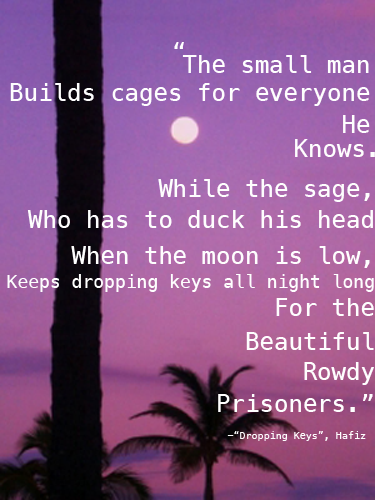A Way of Being

Let me suggest that we consider forgiveness as a “way of being:'” being with one another; being with the world; and being with ourselves. Such a way necessarily (1) impacts our ability to enter into the experiences of others (2) empowers us to offer hospitality and receive the “other” gratefully (3) equips us to make space together for authentic relationship, even in previously unfamiliar territory.
The poetry of Hafiz may stimulate our imaginations in this regard. As a way of being, forgiveness does not need to reduce the humanity of the other in order to “know” them, but instead offers interactive possibilities that can be unbinding for everyone involved.
When we examine the practice of forgiveness in the context of injury (most often compounded injury), forgiveness is the embodied break in a destructive cycle of violence and retribution. Read the inspired words of the poet, and sit with them for a bit. Then identify a destructive cycle in and around your own life experience, where injury has been compounded by reaction upon reaction. Imagine what it will mean for you to be the break in that cycle. I am asking you to consider not only what you might do, but who you will be in the midst of the situation, bringing your whole self.
To think of forgiveness as for-giveness or fore-giveness emphasizes the freedom and healing possibility of such “being.” We become equipped emotionally, spiritually, and creatively for a different quality of action and interaction, even in the darkness of midnight.
Silvio Fittipaldi, in comparing the Zen concept of emptiness with the consciousness and practice of Jesus, suggests that “Christian emptiness is realized in “having the mind of Christ,” which is a forgiving mind, that is, a mind that is open and unbounded in regard to space, social status, and the the law.” (“Zen-Mind, Christian-Mind, Empty-Mind,” in Journal of Ecumenical Studies,19:1, Winter 1982). What it might mean for us to bring such an open and unbound mind to all dimensions of our lives? What jailbreaks will ensue–within us , between us, among us?
